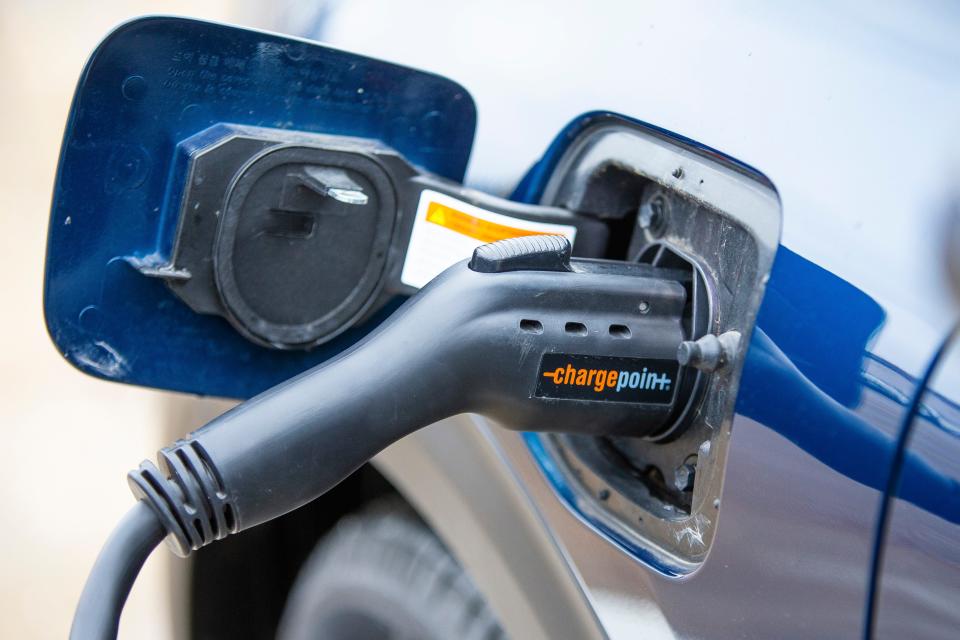Q & A: 'We do not want to continue leaving Black, brown and low-income communities behind'
Thanks to the bipartisan infrastructure law Congress passed last year, Indiana will receive $100 million to install electric vehicle charging stations in the state over the next five years.
The Indiana Department of Transportation released the final draft of its electric vehicle infrastructure deployment plan last month. In response, an alliance that includes civil rights groups and Black-owned businesses in the state is calling on the U.S. Department of Transportation to reject INDOT’s plan. According to the alliance, the plan lacks measures to ensure an equitable distribution of EV infrastructure. In the following Q&A, Jorden Giger of Black Lives Matter-South Bend, one of the member groups in the alliance, and Alyssa Lee, a Notre Dame student who leads the BLMxND collective, explain why this issue matters, and how history provides context.
Q. When you think about racial inequities, you tend to think of such topics as health care and housing. Why should people be concerned about an equitable distribution of electric vehicle infrastructure?
A. Due to a long history of race-based residential segregation, recent studies show that Black people are disproportionately impacted by pollution and greenhouse gas emissions. Harmful particle pollutants, or particulate matter (PM) contain microscopic solids or liquid droplets that can be inhaled. PM is emitted by cars, trucks, and buses and can cause serious health complications. Because Black people are more likely to live in polluted communities than whites, we suffer greater risk of premature death from particle pollution.
It is important for people to be concerned about the equitable distribution of electric vehicle (EV) infrastructure because communities of color are on the frontlines of environmental degradation. The nationwide adoption of electric vehicle infrastructure is a direct response to the environmental and climate-related crisis we face. The mass transition towards electric vehicles will make communities less toxic and healthier. We do not want to continue leaving Black, brown and low-income communities behind. We have a rare opportunity to transform our communities by making them more energy resilient, creating new workforce opportunities for communities of color, and improving health indicators in disadvantaged communities.
Q. In a recent Viewpoint, you note how Black and brown communities were affected when highways were run through them. How does that kind of history inform today's concerns?
A. U. S. Transportation Secretary Pete Buttigieg acknowledged that racism was a “conscious choice” in the planning and construction of the U.S. highway systems. Highways were built through Black communities, dividing them, and further segregating them from white communities, which made them susceptible to divestment and pollution. As a result, systemic racism is at the root of our concerns. Disadvantaged communities will continue to suffer the generational impact of environmental racism without a consistent push for equity in every sector. As the electric vehicle markets will continue to quickly expand, ensuring policy is proactive in its inclusion and equity is pivotal for frontline communities. Without it, history will continue to repeat itself. Although it is a very transformative period for electric vehicle infrastructure, it will also set a precedent for future policy decisions surrounding environmental equity at the local and national level. That is why we believe this plan is so important to the state of Indiana and those most disadvantaged.
Q. You've said that INDOT did not prioritize equity in its plan. What should it have done, in your view, to place a priority on equity?
A. At its onset, the state’s process of creating a plan was inherently exclusionary. The Indiana Department of Transportation (INDOT) formed a working group — charged with deploying EV infrastructure — that lacks representation from Black communities and other communities of color. This should not be the case given the disproportionate impact of gas emissions on low-income communities and communities of color. INDOT set out to gather public input on the plan throughout the summer at public listening sessions, but held only one session in our region of the state. The meeting was held in Plymouth, a city where very few Black folks live. This certainly skewed the kind of input the state received. INDOT’s plan should include goals to procure state or local minority-owned businesses with concentrated and strategic outreach to Black-owned enterprises. It should express the state’s commitment to diversifying and developing the workforce through strategic partnerships. We will need skilled workers to install and maintenance EV stations. The plan should include equity metrics so as to ensure accountability.Q. With the federal government scheduled to complete its review of INDOT's plan by the end of next month, are you hopeful that changes can be made at this point?
A. We are hopeful. We are a member organization of the Indiana Alliance for Equity, Diversity and Inclusion for Electric Vehicle and Economic Opportunities. This is a collective of Black-owned businesses, faith institutions, nonprofits and civil rights groups calling on the U.S. Department of Transportation to reject the Indiana Department of Transportation’s plan based on a lack of measures to ensure an equitable distribution of EV infrastructure and EV-related economic opportunities. We have met with the U.S. Department of Energy and U.S. Department of Transportation’s Joint Office of Energy and Transportation and expressed our concerns. We have also spoken with local South Bend leaders about the lack of equity in the state’s plan and the need to ensure equitable distribution of infrastructure and economic opportunities in the city’s forthcoming plan. Our collective is actively reaching out to media outlets in order to amplify our concerns and better educate the public about the inadequacies in Indiana’s plan with respect to equity. Through these efforts we hope the Department of Transportation will reject Indiana’s plan and make recommendations around equity and inclusion.

This article originally appeared on South Bend Tribune: INDOT's electric vehicle infrastructure plan isn't equitable

